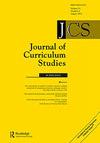框架课程制定:学校管理中的官僚主义与耦合
IF 2
3区 教育学
Q1 EDUCATION & EDUCATIONAL RESEARCH
引用次数: 0
摘要
本文章由计算机程序翻译,如有差异,请以英文原文为准。
Framing curriculum making: bureaucracy and couplings in school administration
ABSTRACT This article aims to undertake a comparative investigation of school administration to understand further the frames of curriculum making. School administration is an under-illuminated aspect of curriculum research. The paper commences from the notion that, in mass education, a school system is operationalized by many schools, which are coupled to each other and to political decisions. Here is the curriculum vital. Building on the classic work of Stefan Hopmann, a curriculum is part of the administrational structure of the school system. The Article suggests several categories that can describe the nature and function of school administration in various contexts. There are external matters of schooling, such as school buildings, school food, etc. and internal matters of schooling, such as curriculum, pedagogy, and evaluation. Individual schools and school administration are coupled via licences, and programmatic, professional, and procedural supervision. The article employs these categories with a comparison of a decentralized Sweden and a centralized Germany. The comparison investigated 290 Swedish municipality school administrations and 45 state education authorities in 4 German federal states. In this comparison many interesting similarities between both contexts can be hightligthed.
求助全文
通过发布文献求助,成功后即可免费获取论文全文。
去求助
来源期刊

Journal of Curriculum Studies
EDUCATION & EDUCATIONAL RESEARCH-
CiteScore
4.70
自引率
4.80%
发文量
19
审稿时长
24 weeks
期刊介绍:
Journal of Curriculum Studies publishes conceptually rich contributions to all areas of curriculum studies, including those derived from empirical, philosophical, sociological, or policy-related investigations. The journal welcomes innovative papers that analyse the ways in which the social and institutional conditions of education and schooling contribute to shaping curriculum, including political, social and cultural studies; education policy; school reform and leadership; teaching; teacher education; curriculum development; and assessment and accountability. Journal of Curriculum Studies does not subscribe to any particular methodology or theory. As the prime international source for curriculum research, the journal publishes papers accessible to all the national, cultural, and discipline-defined communities that form the readership.
 求助内容:
求助内容: 应助结果提醒方式:
应助结果提醒方式:


